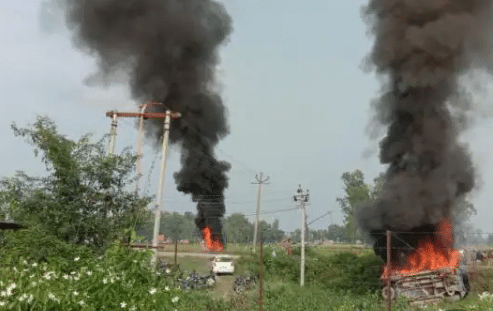Covid patients-Do not panic-post Covid symptoms up to 3-6 months after recovery-Experts
Kanwar Inder Singh/ royalpatiala.in
Does the fight against COVID-19 really end once a negative report comes? What early warning signs to look out for? What sort of food or nutrition should be taken? PIB’s Webinar held today (June 15, 2021) had answers to all these questions. Nutritionist Ishi Khosla and Pulmonologist Dr. Nikhil Narayan Bante explained about Post-COVID symptoms, how to tackle it and also how nutritious food can help us to fight COVID and in recovery post-COVID.
Dr. Nikhil Narayan Bante, Lungs and TB Specialist, pointed out that a large number of COVID recovered patients are facing post-COVID-19 syndromes in the second wave of the pandemic. “Around 50%-70% of patients may experience minor or even major symptoms up to 3-6 months after recovering from COVID-19 and is observed more in those patients who had moderate or severe form of the infection”, he added
Excerpts from the webinar on post-COVID as explained by Dr. Nikhil Narayan Bante:
What is post-COVID-19 Syndrome?
Majority of COVID patients recover in 2 – 4 weeks. However, in some patients, the COVID symptoms persist beyond four weeks – a condition known as Acute Post COVID Syndrome. If the symptoms remain even after 12 months, it is known as Post COVID Syndrome
Most common post-COVID-19 symptoms:
- Weakness / fatigue
- Difficulty in breathing
- Palpitation
- High sweating
- Joint and muscle pain
- Loss of taste and smell
- Sleep disturbances
Psychological symptoms post-COVID:
- Depression
- Anxiety
Reasons behind post-COVID-19 symptoms?
There are two major reasons for post-COVID-19 symptoms:
1) Virus-related:- Coronavirus affects not only our lungs, but can affect all organs including liver, brain and kidney. So, our body takes time to recover from the infection
2) Immunity-related: – Our immune system becomes hyperactive due to the entry of the virus. In the fight between the body and the virus, various chemicals are released which cause inflammation in our organs. In some patients, the inflammation persists for longer duration.
Some common post-covid syndromes
Thromboembolism is the most feared post-COVID-19 condition. It is the obstruction of a blood vessel by blood clots. It can even result in heart attack or stroke, depending on where the clots occur. However, thromboembolism is being observed only in less than 5% of patients recovering from COVID-19.
Pulmonary embolism is a condition in which early signs of blood clot in lungs are shown. Symptoms include difficulty in breathing and fall in blood pressure. Such patients need to be hospitalized immediately and evaluated.
High D-Dimer levels:
Severe to serious patients and those with high D-Dimer levels may require therapeutic anti-coagulants during hospitalization as well as in the post-COVID-19 period for 2-4 weeks. But anti-coagulants should be taken on physician’s reference and in a guarded manner.
Chronic Cough:
Another major post-COVID-19 infection is chronic cough or post infection cough. Dry cough can persist after recovery due to infection in our airways and resultant inflammation. Cough can persist also due to stiffness of lungs when recovery process begins. Deep breathing exercises for patients experiencing dry cough is recommended.

Cough Fatigue:
Post-Covid patients often complain about cough fractures. They may feel pain in the rib-cage towards the lower side of chest, due to chronic cough. It is important to evaluate this condition also. Costochondritis or pain in the rib-cage may be caused after recovery due to inflammation during COVID.
Pulmonary fibrosis
Yet another feared post-COVID syndrome which occurs due to scarring which is when lungs recover from COVID. Scarring does not become clinically significant in 90% of the patients. However, 10% of the patients may need long-term supplemental oxygen. “It is more likely to occur in COVID-19 patients whose lungs got damaged to the extent of above 70%. Even among such patients, lung fibrosis is found only in around 1% of them.
Those who had moderate to severe COVID-19 and were on oxygen therapy, may get lung function tested after a month of recovery. To understand whether lung capacity has been fully restored and oxygen extraction capacity has been completely reinstated to previous levels, suggested the chest specialist. He further informed that many patients recovering from COVID-19 experience chest pain and fear they are getting heart attack. But, heart attacks have been observed only in less than 3% of the patients recovering from COVID.
Post-COVID Nutrition Management:
Clinical Nutritionist Isha Khosla stated that 94% of people who died due to COVID-19 had succumbed because of co-morbidities, which has a common thread of inflammation. Hence, our diet should be anti-inflammatory and we need to eat right, keep our body fit and keep our immune system intact, she suggested.
Sufficiency of Proteins in diet
Proteins should be present in our diet in a focussed manner and, atleast, in two meals, said Ms Khosla. Further, we should pair vegetables with proteins, which will lead to digestion of food in a balanced manner.
Nutritional Supplements
The Clinical Nutritonist cautioned about the usage of nutritional supplements and advised to use it judiciously. “Zinc, Vitamin C and Vitamin D, Vitamin B Complex have gained tremendous importance in these times. These should be taken judiciously and should not be overdone with”. These supplements play an important role in the body’s regeneration,” she advised.
Protective food
These food help in defence mechanism of the body and contain phyto-nutrients and fibres, which are important for the body’s recovery. Hence, protective food should also be taken adequately. There are live organisms found in our intestines which determine our health and recovery. If there has been a damage to those microbes, their food which is fibres should be provided to the body so as to make those microbes grow.
Phyto-nutrients, which come in various colours and are also known as rainbow diet, contain information about which genes to make work, which far cells to activate and which are the ones to suppress. These play an even more important role than vitamins and minerals. “Hence, do consume colourful food and dedicate one meal to these protective food”, advised Ishi Khosla
Protective food include anti-oxidants, anti-inflammatory food, cold-pressed oils, turmeric, ginger, tea and so on.
Hydration: The nutritionist also specially mentioned about the importance of drinking enough water. Hydration levels should be well-maintained during the illness and also post-illness.
Mental health is also related to our gut which has such a profound effect on our body that scientists are now calling it “second brain”. Hence, if our food is not good for body, it also disturbs our mood, apart from our immunity
In short, maintain a healthy diet, take seasonal food and organic food, she concluded.
June 15,2021












